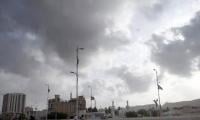Ziauddin Hospital Chairman Dr Asim Hussain, who has also served as the federal minister in the past, said on Wednesday that for the patients of COVID-19, the Sindh government should reserve four to five hospitals in Karachi, which should be equipped with critical care equipment and lab facilities.
Meanwhile, the rest of the hospitals, he said, should treat the patients of other diseases as there were many people suffering from several other communicable and non-communicable diseases in the city, who also needed attention.
“The pandemic of coronavirus is being overhyped in Pakistan like elsewhere in the world. The human race is facing communicable diseases for centuries now and they have started to live with them. We need to adapt to the situation and take it as another pandemic, without scaring our people. The government should reserve four to five hospitals for the coronavirus patients in Karachi while the remaining health facilities should be left for the treatment of common ailments,” Dr Asim said as he spoke to The News on Wednesday.
He advised the Sindh health department to immediately start training critical care specialists to deal with any emergency, saying that there were hardly 10 to 15 critical care specialists in the entire city, who were not enough to deal with a large influx of patients requiring critical care at the specialised hospitals.
“Every hospital should not take and admit coronavirus patients, especially hospitals like the Jinnah Postgraduate Medical Center (JPMC) and the Civil Hospital Karachi as they treat a large number of patients with many other communicable and non-communicable diseases. People are suffering but hospitals are turning away patient with other diseases, which is inhuman”, he remarked.
Claiming that Dr Ziauddin Hospital was the largest private sector health facility in Karachi with three well-equipped campuses in the city, he said 25 per cent of their beds were for providing critical care to the patients, adding that in the developed world, at least 50 per cent beds at the hospitals are reserved for the critical care.
He said from now onwards, the provincial government and the health authorities in Sindh should concentrate on the development of intensive care units (ICUs) and critical care units (CCUs) where critically sick patients, who need life support could be kept and their lives could be saved.
The health care specialist was of the opinion that the health care system would be entirely changed and digitalised after the coronavirus pandemic as the need for coming to hospital for both the physicians and patients would reduce drastically, and the people would consult their physicians remotely with the help of digital appliances, due to which the load of patients on the hospitals would drastically reduce.
“This pandemic is teaching us many things and there are many positive things arising out of this outbreak. One of the most important aspect is the digitalisation of health and reduction in the physical presence of patients at the health care facilities”, he added.
Coronavirus tests
Dr Asim explained that Dr Ziauddin Hospital had started testing for coronavirus since the first week of March and so far they had tested over 700 samples, of which seven came positive.
“We had started testing coronavirus in the first week of March 2020 and for that, we are using internationally-acclaimed Turkish kits, which are of gold standard around the globe. We have four PCR machines and we are going to acquire two more in the days to come,” he said, adding that they did not rely on the Chinese kits, as many developed countries had rejected those due to their suspicious results.
To a query, he said the diagnostic lab of Dr Ziauddin Hospital was accredited with the Pakistan National Accreditation Council (PNAC), which has only accredited two diagnostic laboratories in Karachi, the Dow University’s lab being the other one.
He claimed that they had the capacity to conduct 200 tests in a day to diagnose coronavirus and added that they were offering this testing facility on a commercial basis as the government had not approached them for testing the suspected patients.
Dr Asim explained that they had started to establish specialised isolation wards at their two campuses with ‘positive pressure’ and high efficiency particulate air (HEPA) filters to treat coronavirus patients and added that so far they had not admitted any coronavirus patient at any of their health facilities.
Former incharge of the MQM’s Karachi Tanzeemi Committee Hammad Siddiqui, seen in this image. —...
This representational image shows women chopping animal feed in Jacobabad, Sindh. — AFP/FilePakistani women farmers...
A representational image of a person lighting a stove. — AFP/File The Sui Southern Gas Company is continuously...
Vice Chancellor LUMHS Prof Dr Ikram Din Ujjan awards a degree to a graduate during the first convocation of Bilawal...
Arts Council of Pakistan President Ahmed Shah in a group photo during the Annual Election 2024 at ACP Building in...
A representational image of a police tape restricting an incident scene. — Reuters/FileA 26-year-old electrician,...







